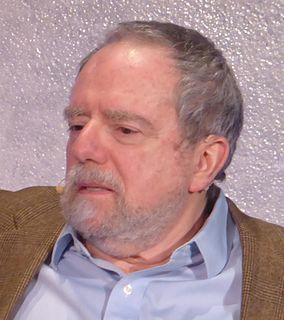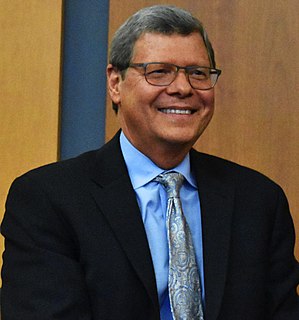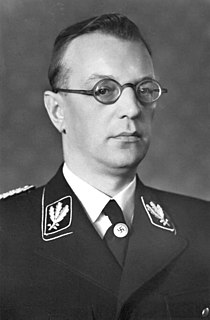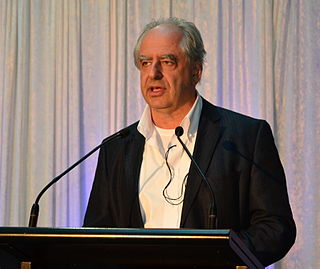Top 100 Nihilism Quotes & Sayings - Page 2
Explore popular Nihilism quotes.
Last updated on April 16, 2025.
The Nazis, for him, are merely available movie tropes--articulate monsters with a talent for sadism. By making the Americans cruel, too, he escapes the customary division of good and evil along national lines, but he escapes any sense of moral accountability as well. In a Tarantino war, everyone commits atrocities. Like all the director's work after 'Jackie Brown,' the movie is pure sensation. It's disconnected from feeling, and an eerie blankness--it's too shallow to be called nihilism--undermines even the best scenes.
When it comes to explaining human thought and behavior, the possibility that heredity plays any role at all still has the power to shock. To acknowledge human nature, many think, is to endorse racism, sexism, war, greed, genocide, nihilism, reactionary politics, and neglect of children and the disadvantaged. Any claim that the mind has an innate organization strikes people not as a hypothesis that might be incorrect but as a thought it is immoral to think.
Religion itself cannot but be dynamic which is why "return" is an incorrect term. A return to the forms of religion which perhaps existed a couple of centuries ago is absolutely impossible. On the contrary, in order to combat modern materialistic mores, as religion must, to fight nihilism and egotism, religion must also develop, must be flexible in its forms, and it must have a correlation with the cultural forms of the epoch.
The saying "no self, no problem" probably comes from Zen. In their cultures, where Buddhism is kind of taken for granted, as well as karma, causality, former and future life, and the possibility for becoming enlightened, then it's safe to skirt the danger of nihilism, which would be, I don't exist because Buddha said I have no self, and therefore I have no problem because I don't exist. That would be a bad misunderstanding. But in those cultures, it would not be as easy to have that understanding as it would be here in the west, where we really are nihilistic.
The Sexual Revolution is a complete rebellion against authority, natural and supernatural, even against the body and its needs, its natural functions of child bearing. This is not reverence for life, it is a great denial and more resembles Nihilism than the revolution that they think they are furthering.
Philosophy would do well to desist from issuing any further injunctions about the need to re-establish the meaningfulness of existence, the purposefulness of life, or mend the shattered concord between man and nature. It should strive to be more than a sop to the pathetic twinge of human self-esteem. Nihilism is not an existential quandary but a speculative opportunity.
In face of this modern nihilism, Christians are often lacking in courage. We tend to give the impression that we will hold on to the outward forms whatever happens, even if God really is not there. But the opposite ought to be true of us, so that people can see that we demand the truth of what is there and that we are not dealing merely with platitudes. In other words, it should be understood that we take this question of truth and personality so seriously that if God were not there we would be among the first of those who had the courage to step out of the queue.
Free men are aware of the imperfection inherent in human affairs, and they are willing to fight and die for that which is not perfect. They know that basic human problems can have no final solutions, that our freedom, justice, equality, etc. are far from absolute, and that the good life is compounded of half measures, compromises, lesser evils, and gropings toward the perfect. The rejection of approximations and the insistence on absolutes are the manifestation of a nihilism that loathes freedom, tolerance, and equity.
In the doctrine of the world and humankind as 'will to power and nothing else', Heidegger identified not an antidote to nihilism, but the completion of it. For what can be more destructive of truth and value than the doctrine that these are simply the impositions on the world of human exercises of power?
... the twin concepts of nihilism and the antihero have had it. What began with The Wild One and James "nobody understands me" Dean, ran with increasing vehement negativism up through the Stones and Velvets and Iggy ... [I]t may be time, in spite of all indications to the contrary from the exterior society, to begin thinking in terms of heroes again, of love instead of hate, of energy instead of violence, of strength instead of cruelty, of action instead of reaction.
The man of the future who will redeem us not only from the hitherto reigning ideal but also from that which was bound to grow out of it, the great nausea, the will to nothingness, nihilism; this bell stroke of noon and of the great decision that liberates the will again and restores its goal to the earth and his hope to man; this Antichrist and anti-nihilist; this victor over God and nothingness - he must come one day.
Perhaps - and this goes for the Kyoto School too - one of these insights is that nothingness and unknowing don't have to be equated with a destructive nihilism but with the experience of unity and participation - whilst resisting the tendency of objectifying metaphysics to claim that we can in some way 'know' that this experienced unity is really the truth of how things are, i.e., reveals being itself.
I rather shared Nietzsche's conception of the kind of individual that an ideal education should be cultivating. 'Authenticity' is not Nietzsche's term, but as used by some existentialists, it nicely captures what Nietzsche admired - the resolve of an individual person to forge his or her own 'table of values', to be emancipated from strait-jacketing conventions, traditions, and ideologies. As embodied in the 'Overman', authenticity is the antidote to 'bad' nihilism.
All roads are blocked to a philosophy which reduces everything to the word "no." To "no" there is only one answer and that is "yes." Nihilism has no substance. There is no such thing as nothingness, and zero does not exist. Everything is something. Nothing is nothing. Man lives more by affirmation than by bread.
Continental thinkers have been obsessed with bourgeois man as representing the worst and most contemptible failure of modernity, which must at all costs be overcome. Nihilism in its most palpable sense means that the bourgeois has won, that the future, all foreseeable futures, belong to him, that all heights above him and all depths beneath him are illusory and that life is not worth living on these terms.
When I was in college, I remember fearing that the dreary grind of adulthood would feature infinitely more existential dread than frat parties had, but the opposite has been true for me. I'm much less likely to feel that gnawing fear of aimlessness and nihilism than I used to be and that's partly because education gave me job opportunities, but it's mostly because education gave me perspective and context.
I'm not sure if Cupitt himself still uses this term, but it's useful in suggesting that, actually, there are more choices than the choice between nihilism and faith. In fact, the issue may not be faith as such but the fact that for millennia, Christianity has buttressed itself with a particular kind of metaphysics that has now seemingly reached the end of its life-span. But perhaps Buddhist metaphysics could provide an alternative here - or, at least, offer a direction of travel.

































